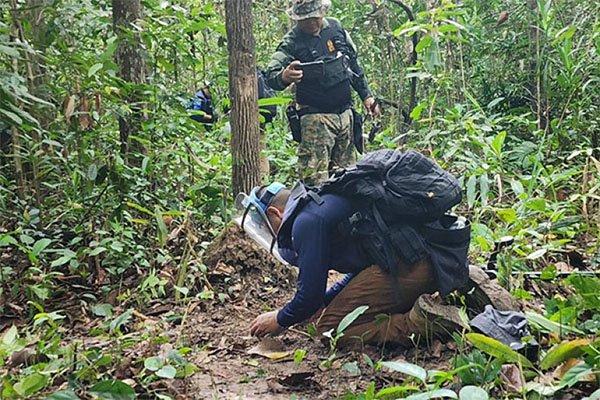
On July 23rd, local time, the acting Prime Minister of Thailand, Prathapong, announced a reduction in diplomatic relations with Cambodia, recalling the Thai Ambassador to Cambodia and expelling the Cambodian Ambassador from the country. He also instructed the Thai Ministry of Foreign Affairs to submit a protest letter.
A new dispute erupted! Thai soldiers injured by landmines at the Thai-Cambodian border, both countries accusing each other of violating sovereignty (Observer Network)
[Article/Observer Network, Chen Sijia] According to a report by the National Newspaper of Thailand on the 21st, in response to the incident involving Thai soldiers stepping on landmines, the Acting Prime Minister of Thailand, Prathapong, issued a warning that if further evidence proves Cambodia has laid landmines on Thai territory, Thailand might recall its Ambassador to Cambodia.
On July 16th, local time, Thai soldiers were injured while patrolling the Thai-Cambodian border, resulting in three soldiers being wounded, one of whom was critically injured and had to undergo amputation. Following the incident, both Thailand and Cambodia immediately accused each other. The Thai Ministry of Foreign Affairs issued a statement on July 20th, condemning Cambodia for allegedly violating the Ottawa Mine Ban Convention and encroaching on Thailand’s sovereignty and territorial integrity, declaring to take action in accordance with the convention.
Cambodia rejected these accusations and accused Thai soldiers of trespassing into its territory. A spokesperson for the Cambodian Ministry of Defense, Mali Sokchetka, made a statement on the same day denying the allegations and accusing Thai soldiers of deviating from their agreed patrol routes and entering Cambodia territory under the terms of a treaty signed between France during colonial times and Siam (the old name of Thailand). This led to the detonation of wartime remnants of landmines.
According to reports by the Khmer Times in Cambodia, Sokchetka stated in her declaration: “Cambodia firmly denies the allegations made by Thailand. The injuries suffered by Thai soldiers were due to them straying from the agreed patrol routes and violating the 2000 memorandum of understanding. They took a new route into Cambodia territory, where there are still unexploded landmines—an area repeatedly warned about by Cambodia.
”
Socetah accused Thailand of destabilizing Cambodia’s territory, stating that according to the treaties signed by France and Siam in 1904 and 1907, as well as the maps drawn, the area where the incident occurred was “clearly within Cambodian territory.”
“Action must be taken to demonstrate respect for sovereignty and international law, not just remain on the lips. Cambodia urges Thailand to fully implement the memorandum of 2000 and peacefully resolve disputes through mechanisms such as the International Court of Justice,” Socetah added. “Why were Thai soldiers instructed to deviate from the patrol routes agreed upon by both sides? Is this deliberate provocation aimed at inciting tension?”
On July 20th, Thai troops conducted mine-clearing operations in the Chong Bok region along the Thai-Cambodian border. On July 16th, Thai soldiers stumbled upon a landmine while patrolling in the Chong Bok area, resulting in injuries to three soldiers. The Chong Bok region is located at the border between Ubon Ratchathani Province in Thailand and Phetchaburi Province in Cambodia, where longstanding boundary disputes have existed.
According to the Bangkok Post, regarding the latest border dispute, the Second Army District of Thailand stated on July 17th that it is investigating the type of explosive landmines and their detonation time. A Thai military source revealed that Thai soldiers had discovered an American-made PMN-2 anti-personnel mine, which was later found during another search. These mines were recently laid.
However, a spokesperson for the Thai Army, Vuntai Suvarit, indicated that it is still uncertain whether these mines were newly laid, and it will take several days to confirm the facts.
On July 20th, the Thai Ministry of Foreign Affairs issued a statement condemning Cambodia for violating its obligations under the Ottawa Mine Ban Convention, accusing Cambodia of encroaching on Thailand’s sovereignty and territorial integrity.
The statement announced that Thailand will take action in accordance with the Ottawa Mine Ban Convention, while continuing to resolve its differences with Cambodia through existing bilateral channels. It also calls on Cambodia to cooperate in advancing mine clearance along the border.
The Thai military has increased troop deployments at the Thai-Cambodian border and initiated mine clearance operations in the Champhouk area. The Thai military reported finding 10 landmines around the incident site from July 18th to 20th.
According to the National Newspaper of Thailand, Acting Prime Minister Prachatep stated on the 21st that if further evidence proves that Cambodian troops have laid mines on Thai territory, Thailand might recall its ambassador to Cambodia. He has instructed the Ministry of Foreign Affairs to formally protest against Cambodia. Prachatep emphasized, “Thailand is striving to avoid war, but we will not accept any violation of our territory.”
Reuters reported that data from the Cambodian Mine Clearance Center suggests that there are still 4 million to 6 million landmines scattered across Cambodia. In just the first four months of this year alone, five people have died or been injured by landmines or unexploded ordnance in Cambodia.
Previously, a brief conflict between the Thai and Cambodian military occurred at the border dispute area on May 28th, with exchanges lasting about 10 minutes, resulting in one Cambodian soldier’s death. Shortly after the incident, audio recordings of a phone call between Prime Minister Prachachat and the Chairman of the Cambodian People’s Party, former Prime Minister Hun Sen, regarding the border dispute were leaked, causing a major stir and leading to Prachachat being suspended by the Constitutional Court of Thailand.